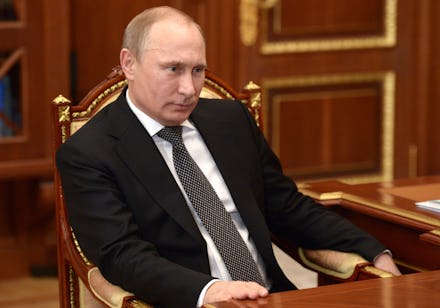Russia's Economy Is Totally Screwed. Here's Why You Should Care

Bad news for Vladimir Putin: The Russian economy is staggering thanks to a collapse of its currency, the ruble. It's certainly bad news for Russia, but it could have big ramifications for the rest of the world too.
The value of the ruble has dropped nearly 20% in the past 24 hours, a figure unmatched since the country's economic crisis in 1998. While the country has been struggling financially over the past few months, what we're seeing now is a drastic drop.
"It's a really weird mix of economics and geopolitics," Maxim Eristavi, a journalist who has covered Russia and Eastern Europe for the past decade, told Mic. "Obviously it got worse over the last two days."
The Russian crisis is rooted in two things: The international sanctions placed on it following the annexation of Crimea, and the plummeting price of oil, on which the country is hugely dependent, have been hobbling the nation for a while.
But all of it came to a head over the past few days, when investors started pulling money out of the country. It became a full-on panic as more and more investors followed suit, leading to the huge drop.
Investors pulling their money isn't something only happening in Russia; with 2015 uncertain, Eristavi said, many are looking to invest in more stable countries like the U.S., rather than developing ones like Russia, Turkey and South Africa. But those other countries haven't had the panic-driven downward spiral the ruble has seen.
What it means: The collapse of the ruble isn't going to tear down the global economy or anything. But a weakened Russia could dramatically alter the balance of power on the world stage.
On the one hand, if President Vladimir Putin and other Russian leaders need to turn inward to fix their economy, it may make it easier to get the country to compromise its stances on Syria and Ukraine, which would make life easier for the U.S. But, as Bloomberg Businessweek points out, the opposite could be true as well — Putin could use the economic struggles as a reason to use the military as a uniting force.
"It says a lot that maybe there's something going on politically speaking behind doors," Eristavi said. "Everybody is so sure that it will lead to Russian backtracks ... But in the longer perspective, I'm not so sure it's the right way to deal with this problem."
The previous two economic crises came right after the dissolution of the Soviet Union and in 1998, when the country defaulted on its debts. The latter led to a collapse of some democratic institutions, and this crisis could end up with a similar outcome.
"There is a lot of cheering for the ruble's collapse," Eristavi said. "[But] it's not something that will help us find a compromise."